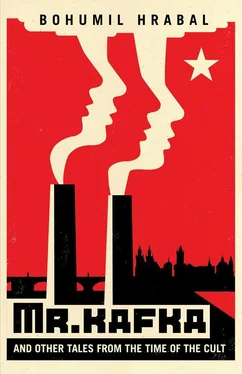The stonemason now barely paid any attention when another truck drove into the depot. He watched idly as they tossed basketfuls of letters onto the pile of scrap paper, covering the bloodstained paper and boxes from the meat-processing plant. Nor was he surprised to learn that there were seven hundred kilos of letters, all written by Prague school children in response to an essay contest, sponsored by the radio, on the theme: How can we make our country ever more beautiful? Then the old lady in the beret walked into the depot, put her little bundle on the scales, the manager weighed it, then tossed it onto the pile, and said: “That’s five kilos. Here’s one crown.”
“One crown?” complained the old lady. “There were letters in that bundle from my lovers!”
“Lady, I’m sorry, but this ain’t no auction house. I don’t care if Rudolph Valentino wrote you those letters, you get exactly the same: twenty hellers a kilo, one crown for five kilos. Eine krone! ” he shouted, but the old lady was already up to her waist in scrap paper, ploughing her way through the bloody papers and animal membranes, whimpering in pain, until at last she waded out of the pile with her bundle, her hands smeared with blood. She untied it and held something up.
“These, I’ll have you know, are letters written to me by a lieutenant in the lancers, and this is one from someone who robbed a cash box just for my sake and ended up in Spandau Prison. And here…”
“Look, lady,” the manager said, “this here’s a scrap-paper depot, but you’ve made your point. Here’s five crowns, from my own pocket. Now clear out!” He took a step forward, kicked the air, then wiped his forehead.
“The mirrors don’t lie,” said Mr. Mit’ánek.
“You’ve seen It Happened in Broad Daylight , haven’t you?” the mother shrieked. “If that isn’t enough for you, what is?” She shook the wire mesh, unaware that as she crouched down, the better to see into the cellar, she had spread her legs wide apart. Her son, Marty, ran out of the basement.
“Mrs. Karásková, please. I’m a volunteer police officer,” Mr. Mit’ánek said. “Don’t make a public issue out of this.”
But Mrs. Karásková whacked the child, and the sound of his wailing faded in the distance. The boys resumed their game, kicking the ball against the screen and practicing the Wall Pass.
“Don’t you think all this art has made Valerián’s ears stick out?” asked the aunt. “They’re kind of like parchment, like he was at death’s door. Even his nose is looking a little blue…”
“For the love of God, Auntie!” shouted Mr. Valerián. “I could strangle you, just like this,” and he cocked his chin toward the mold containing the Slavic warrior.
“I might be able to persuade the local council to send you to a holiday camp, free of charge,” said Mr. Mit’ánek. “I have a lot of clout with them,” and he laughed at the thought that one day, perhaps, when they wrote about the artist who had once worked in a cellar on a cul de sac, his own name might figure in the story, too.
“I’m fine, but if you could just…” Mr. Valerián said, and he turned to vomit over his shoulder, “… if you could just help me carry that painting to the competition.”
The old lady left the depot bent over like a broken bush, carrying her letters. She walked over to St. Thaddeus and held up a set of photos for the saint to see, utterly unconcerned that the stonemason sitting on the scaffolding beside his mortar trough could see them as well.
“My dear, sweet Thaddeus, d’you see this? This one was me, Cleo, the dancer, and here’s a picture from Leipzig, when our tigers escaped. I danced with them in a cage. They got out and posed in front of this monument, all eight of them, making a tableau because they thought it was part of the act. And here’s one of them chasing after a streetcar, and people were passing out. And here’s where they turned a hose on them, and the tigers gamboled about in the water because they thought it was part of the act, too, and they had to shoot them in the end. Here’s a picture of the police posing with the dead tigers, and here’s one when their trainer showed up, and when she saw her darling animals lying there dead, she shot herself too. .. My dear, sweet Thaddeus, can you still see Cleo the dancer locked up inside me?”
Mr. Valerián, the artist, and Mr. Mit’ánek, the auxiliary policeman, stood in front of a large wrought-iron gate decorated with gilded lilies. A footpath of golden sand wound its way under some elm trees and through a pleasure garden with a palace at the end of it. They walked up the path and came to a porter’s lodge in front of the palace. Straddling a chair was a porter, staring intently at the red carpet that emerged like a giant tongue from the palace entrance. A man walked out onto the carpet, his arms spread wide, his face ashen, making gagging noises. The porter stood up, grabbed a bucket from under a box hedge, held it under the gentleman’s chin, dropped the handle over his neck, and, while the man was throwing up, the porter wiped flecks of vomit from his chest. When the man finished vomiting, he walked away, hiccupping and whimpering softly to himself, his eyes wet with tears. He wobbled along the pathway, past Mr. Mit’ánek and Mr. Valerián, barely able to navigate his way out through the ornate gateway.
“The jury must be having some kind of banquet,” said Mr. Mit’ánek, rubbing his hands.
“So, what have you got for us?” asked the porter, as he put the bucket and the rag back behind the box hedge.
“It’s for the Jirásek competition,” Mr. Mit’ánek said, pointing to the large framed picture covered with a sheet.
“You’ll want the second floor then. The ground floor is already filled up — can you guess with what?” asked the porter, then he turned away and shouted, “Vašek! Don’t make me take my belt off!”
“Portraits of Jan Kozina at the gallows?” asked Mr. Valerián.
“Is that what you’re bringing us? A Kozina?” asked the porter. He turned and made as though he were getting ready to undo his belt. “Vašek, stop throwing sand in Ferda’s eyes or I’ll give you a thrashing.”
“A Kozina,” said Mr. Valerián.
“Good thinking,” said the porter. “Every painter thought the others would do Kozina, so we only have twenty-five of those, but hang onto your hat,” the porter laughed. “Durynk, the traitor and murderer Durynk? As of today, they’ve brought in — and I don’t want to lie to you,” he said, leaning into the porter’s booth, “they’ve brought in ninety-six Durynks.”
“Good thing I’m submitting a Kozina,” Mr. Valerián said, shuddering.
The stonemason hopped down from his perch, the sexton looked at his watch, then both entered the bell tower and started up the winding staircase.
“Are they going to use dynamite?” asked the stonemason.
“No, and they’re not even using ekrasite,” the sexton said, “they’re using donorite.” Then he turned and hurried up the corkscrew stairway. Through the tower windows, they could see that they were now higher than the surrounding rooftops. When they reached the level where the bell hung, they looked through the gothic window frames and out over the city. Across the river stood a gigantic statue crosshatched with scaffolding.
“A German company offered to dismantle it with a special cutting tool, but they didn’t want cash for it, they wanted a supply of Carlsbad clay to make fine china. Instead, we offered to buy their saw outright, but the Germans said the saw was special and not for sale. So the job went to a Swiss company,” the sexton said, sitting down on the gothic windowsill and placing a telescope in his lap. The breeze made waves in his hair. “They drilled sixteen hundred holes altogether. When the engineer gives the signal, they’ll throw the switch and the whole statue will come apart, piece by piece.”
Читать дальше












